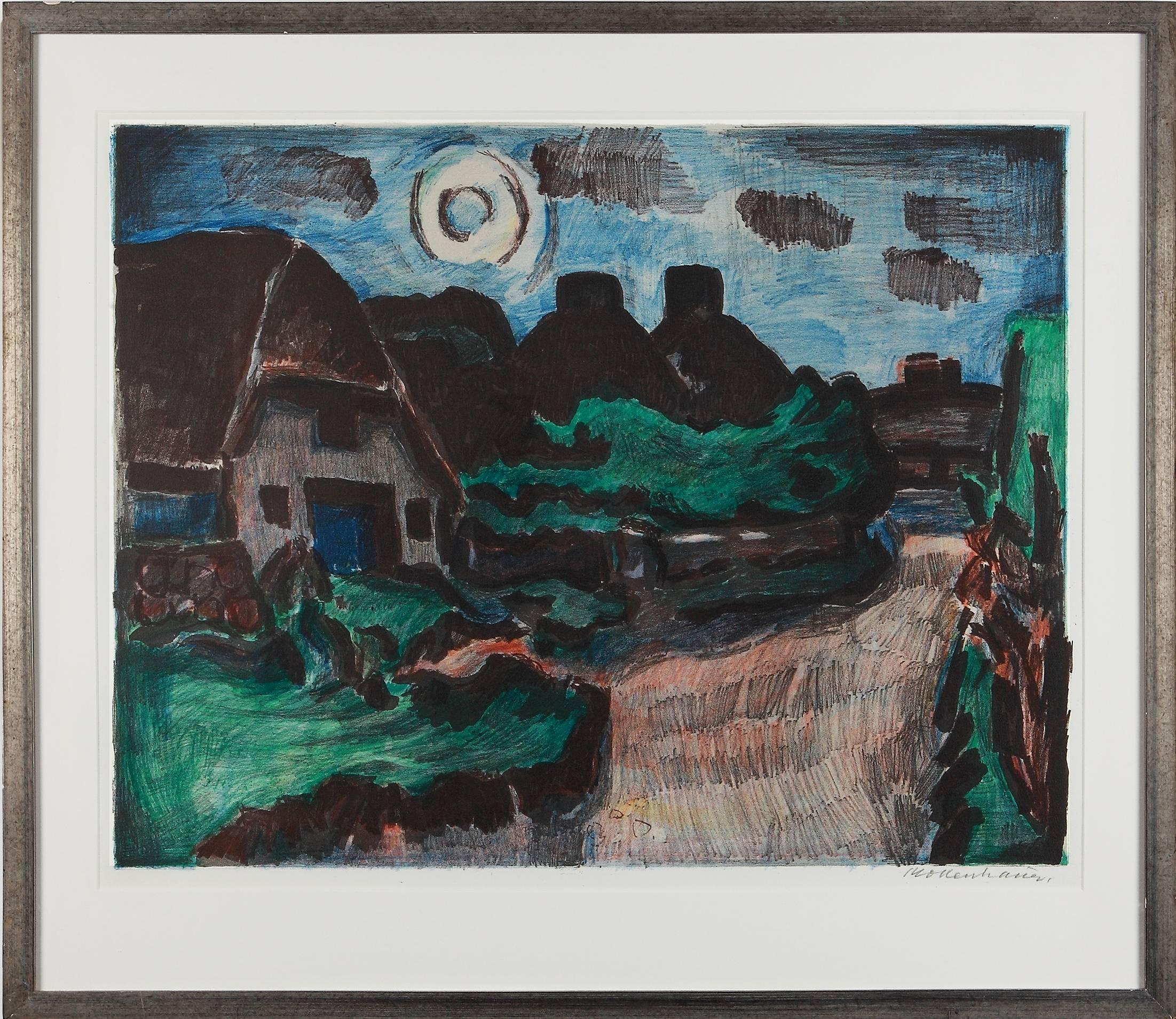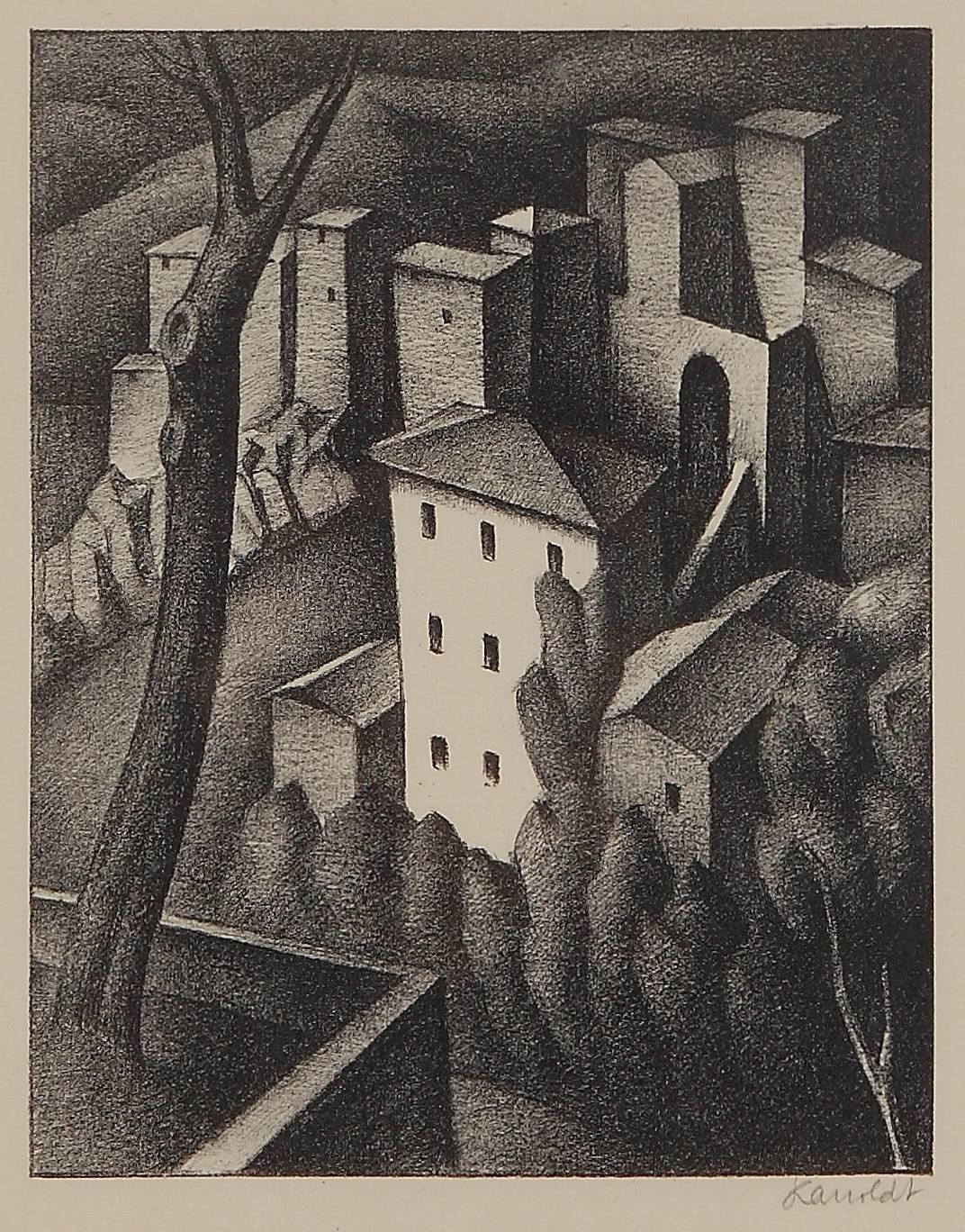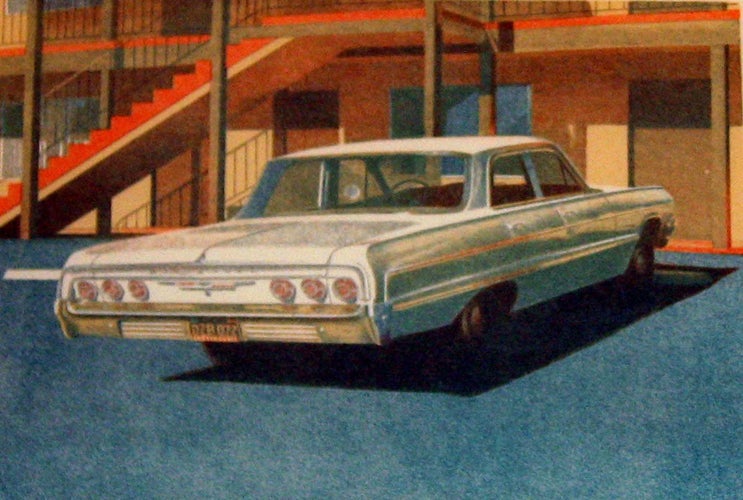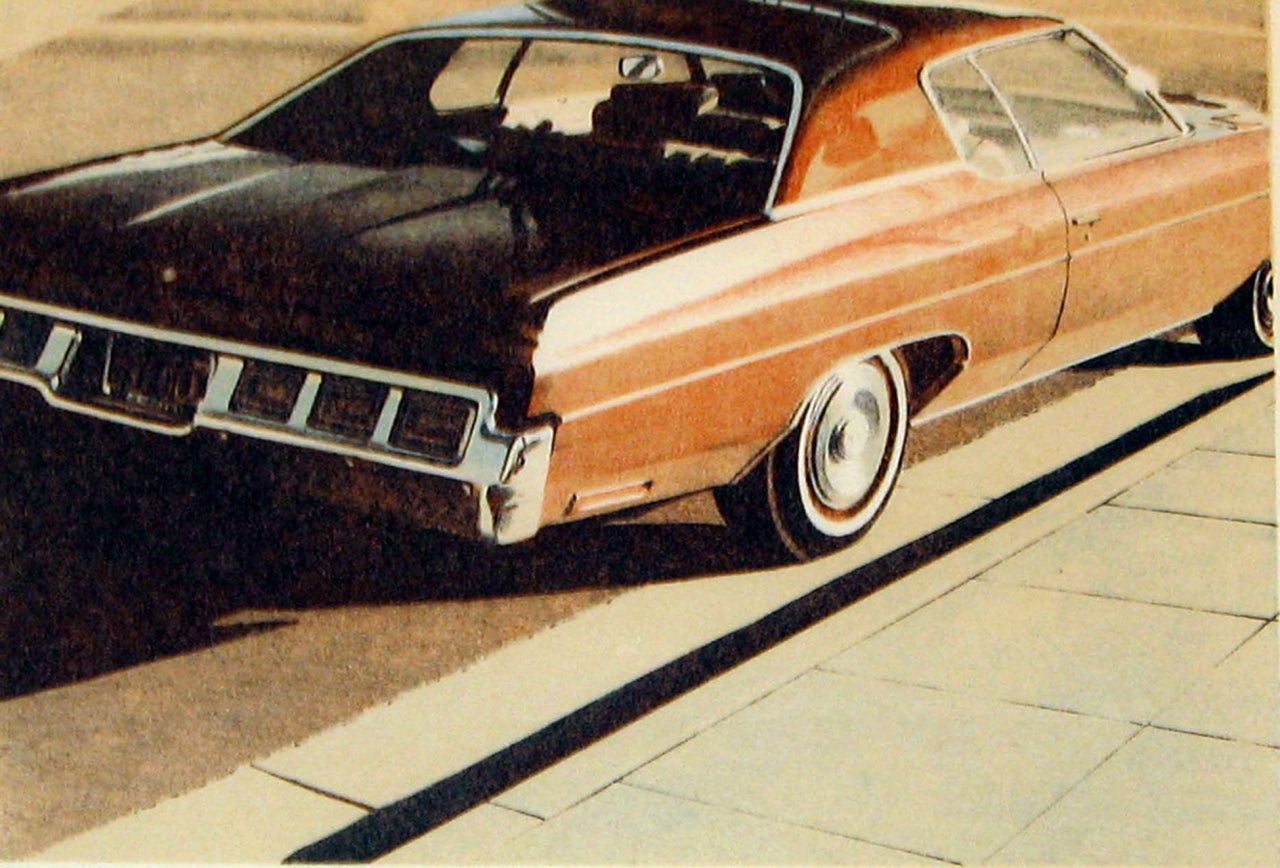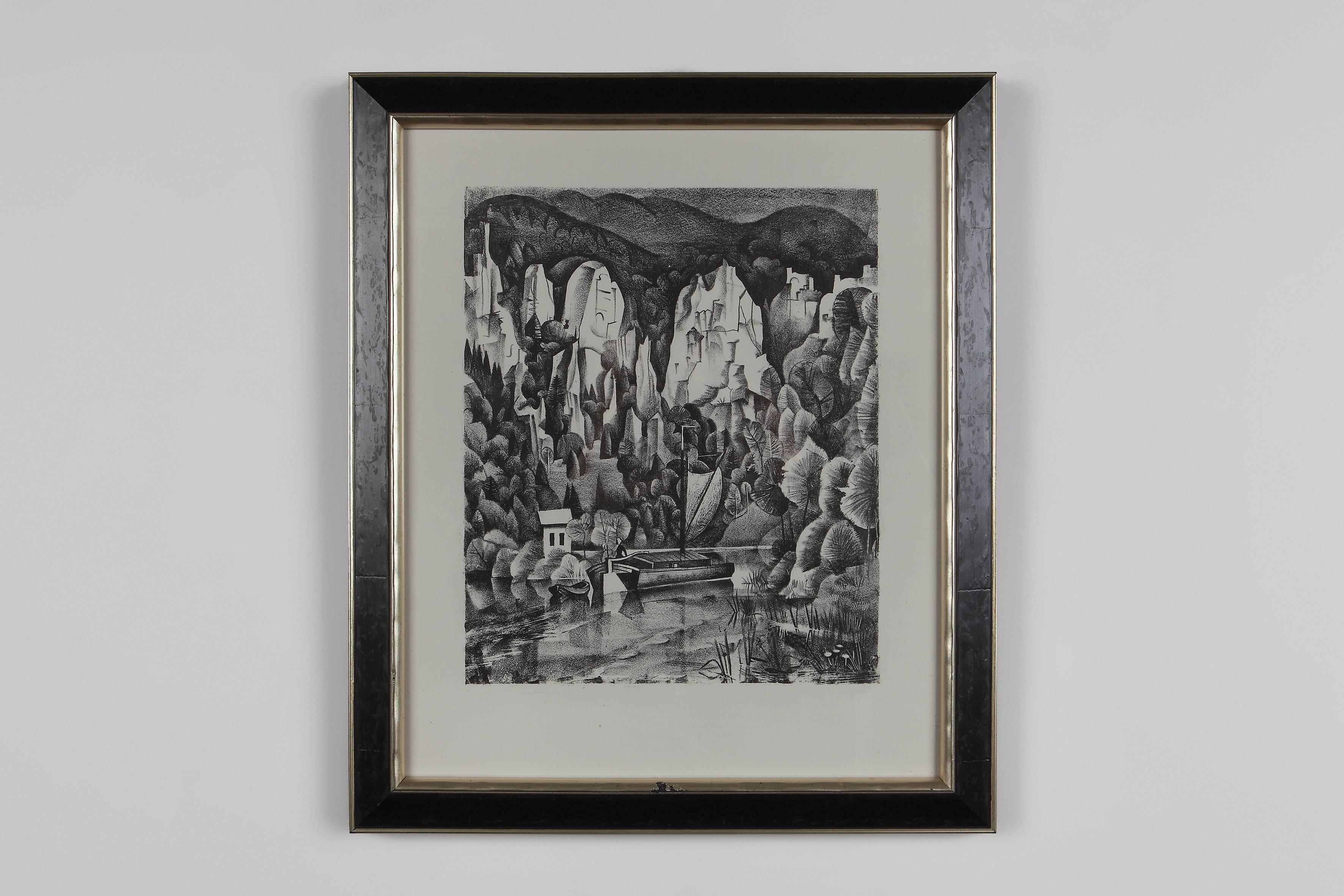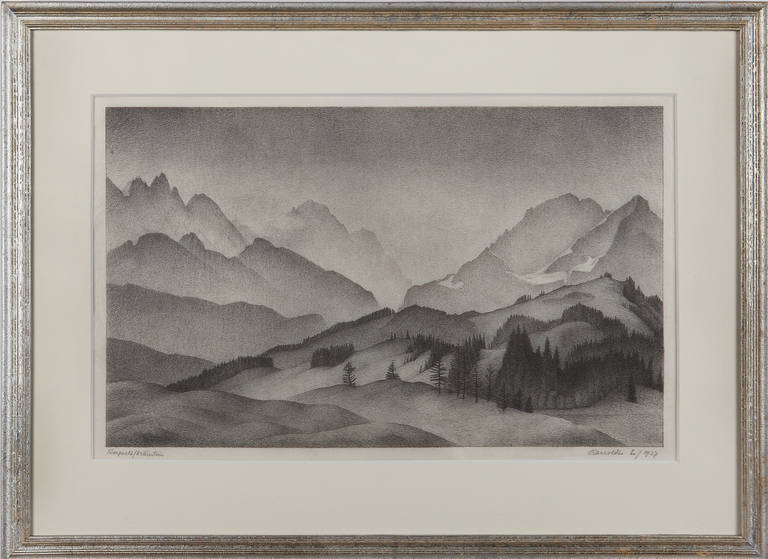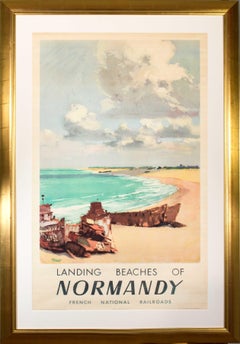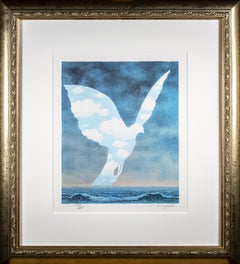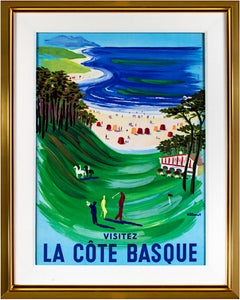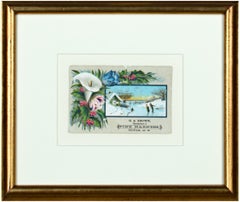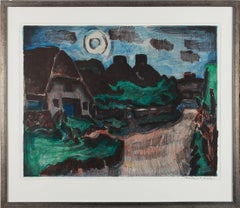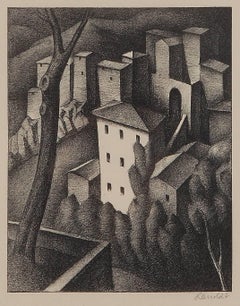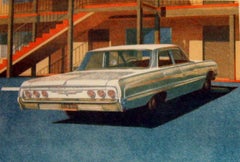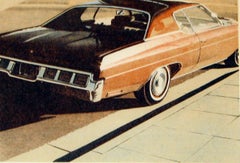Items Similar to 19th century color lithograph seascape boat ship waves maritime landscape
Want more images or videos?
Request additional images or videos from the seller
1 of 10
Currier & Ives19th century color lithograph seascape boat ship waves maritime landscapec. 1850
c. 1850
About the Item
"Iron Steam Ship Great Britain" is an original hand-colored lithographed published by Currier & Ives. It depicts a large British steam ship on the water. The caption below says "3500 Tons. Engine 1000 Horse power. Weight of Iron used in the Ship and Engine is 1500 Tons. THE LARGEST IN THE WORLD. Length from Figurehead to Tafrail 322 Fe3et. Main breadth 50' 6" ... Depth 32' 6" Lieut. Jaf. Hosken R.N. Commander."
8" x 12 3/4" art
17 1/8" x 21 1/2" frame
Currier & Ives produced their prints in a building at 33 Spruce Street where they occupied the third, fourth and fifth floors. The third floor was devoted to the hand operated printing presses that were built by Nat's cousin, Cyrus Currier, at his shop Cyrus Currier & Sons in Newark, NJ. The fourth floor found the artists, lithographers and the stone grinders at work. The fifth floor housed the coloring department, and was one of the earliest production lines in the country.
The colorists were generally immigrant girls, mostly German, who came to America with some formal artistic training. Each colorist was responsible for adding a single color to a print. As a colorist finished applying their color, the print was passed down the line to the next colorist to add their color. The colorists worked from a master print displayed above their table, which showed where the proper colors were to be placed.
At the end of the table was a touch up artist who checked the prints for quality, touching-in areas that may have been missed as it passed down the line. During the Civil War, demand for prints became so great that coloring stencils were developed to speed up production.
Nat Currier and Jim Ives described their business as "Publishers of Cheap and Popular Pictures" and produced many categories of prints. These included Disaster Scenes, Sentimental Images, Sports, Humor, Hunting Scenes, Politics, Religion, City and Rural Scenes, Trains, Ships, Fire Fighters, Famous Race Horses, Historical Portraits, and just about any other topic that satisfied the general public's taste. In all, the firm produced in excess of 7500 different titles, totaling over one million prints produced from 1835 to 1907.
- Creator:Currier & Ives (1834 - 1907, American)
- Creation Year:c. 1850
- Dimensions:Height: 17.125 in (43.5 cm)Width: 21.5 in (54.61 cm)
- Medium:
- Period:
- Condition:
- Gallery Location:Milwaukee, WI
- Reference Number:Seller: 7910g1stDibs: LU60532098273
Currier & Ives
Currier and Ives was a prominent American printmaking establishment headquartered in New York operating from 1835 to 1907. Nathaniel Currier (1813-1888) started his business on his own, but later merged with James Merritt Ives (1824-1895), becoming "Currier and Ives" in 1857. They produced and sold hand-colored lithographs which could be produced relatively quickly and cheaply. They called themselves "the Grand Central Depot for Cheap and Popular Prints". The company published around 7,500 lithographs in its 72 years in business.
About the Seller
4.9
Gold Seller
Premium sellers maintaining a 4.3+ rating and 24-hour response times
Established in 1966
1stDibs seller since 2017
429 sales on 1stDibs
Typical response time: 2 hours
- ShippingRetrieving quote...Shipping from: Milwaukee, WI
- Return Policy
Authenticity Guarantee
In the unlikely event there’s an issue with an item’s authenticity, contact us within 1 year for a full refund. DetailsMoney-Back Guarantee
If your item is not as described, is damaged in transit, or does not arrive, contact us within 7 days for a full refund. Details24-Hour Cancellation
You have a 24-hour grace period in which to reconsider your purchase, with no questions asked.Vetted Professional Sellers
Our world-class sellers must adhere to strict standards for service and quality, maintaining the integrity of our listings.Price-Match Guarantee
If you find that a seller listed the same item for a lower price elsewhere, we’ll match it.Trusted Global Delivery
Our best-in-class carrier network provides specialized shipping options worldwide, including custom delivery.More From This Seller
View AllLanding Beaches of Normandy, French National Railroads
Located in Milwaukee, WI
Albert Victor Eugene Brenet was born June 25, 1903 in Harfleur, France, near Le Havre. He died at the age of 102 on July 4, 2005 in Paris. He painted primarily in gouache. Brenet is ...
Category
1940s Landscape Prints
Materials
Lithograph
"L'Entree en scene (The Emergence), " Color Lithograph after Rene Magritte
By René Magritte
Located in Milwaukee, WI
"L'Entree en scene (The Emergence)" is a color lithograph after a 1961 original piece by Rene Magritte. A transparent bird flies over the ocean. The body of this bird shows through it a clean light sky with fluffy clouds. The view around the bird is instead the dark night, stars shine at the top of the scene. Clouds blow by and the waves are turbulent.
Art: 12.13 x 9.75 in
Frame: 22.75 x 20.38 in
René-François-Ghislain Magritte was born November 21, 1898, in Lessines, Belgium and died on August 15, 1967 in Brussels. He is one of the most important surrealist artists. Through his art, Magritte creates humor and mystery with juxtapositions and shocking irregularities. Some of his hallmark motifs include the bourgeois “little man,” bowler hats, apples, hidden faces, and contradictory texts.
René Magritte’s father was a tailor and his mother was a miller. Tragedy struck Magritte’s life when his mother committed suicide when he was only fourteen. Magritte and his two brothers were thereafter raised by their grandmother.
Magritte studied at the Brussels Academy of Fine Arts from 1916 to 1918. After graduating he worked as a wallpaper designer and in advertisement. It was during this period that he married Georgette Berger, whom he had known since they were teenagers.
In 1926, René Magritte signed a contract with the Brussels Art Gallery, which allowed him to quit his other jobs and focus completely on creating art. A year later he had his first solo show at the Galerie la Centaurie in Brussels. At this show Magritte exhibited what is today thought of as his first surrealist piece, The Lost Jockey, painted in 1926. In this work a jockey and his steed run across a theater stage, curtains parted on either side. Throughout the scene, there are trees with trunks shaped somewhat like chess pawns with musical scores running vertically up their sides and branches sticking out from all angles. Critics did not enjoy this style of art; it was new, different, and took critical thought to understand, but The Lost Jockey was only the first of many surrealist artworks Magritte would paint.
Because of the bad press in Brussels, René and Georgette moved to Paris in 1927, with the hope that this center of avant-garde art would bring him success and recognition. In Paris, he was able to become friends with many other surrealists, including André Breton and Paul Éluard. They were able to learn from and inspire one another, pushing the Surrealist movement further forward.
It was also in Paris that Magritte decided to add text to some of his pieces, which was one of the elements that made his artwork stand out. In 1929, he painted one of his most famous oil works: The Treachery of Images. This is the eye-catching piece centered on a pipe. Below the pipe is written “Ceci n’est pas un pipe,” which translates to “This is not a pipe.” This simple sentence upset many critics of the time, for of course it was a pipe. Magritte replied that it was not a pipe, but a representation of a pipe. One could not use this oil on canvas as a pipe, to fill it with tobacco and smoke it. Thus, it was not a pipe.
In 1930, Magritte and Georgette moved back to Brussels. Though they would travel to his exhibitions elsewhere, their home going forward would always be in Brussels.
Magritte had his first American exhibition at the Julien Levy Gallery in New York City in 1936 and his first show in England two years later in 1938 at The London Gallery...
Category
2010s Surrealist Landscape Prints
Materials
Lithograph
'La Côte Basque' original lithograph travel poster with beach and golf
By Bernard Villemot
Located in Milwaukee, WI
This poster, titled 'La Côte Basque' in the image, was intended to draw people to travel to the Basque coast of Spain. The image is dominated by the serene blues, greens and yellows of the golf course and sandy beach. Throughout the vista, figures can be seen at leisure golfing, riding horseback, eating at restaurants, and sunbathing.
34 x 23.75 inches, poster
43.5 x 33.25 inches, image
Signed in the stone, lower right
Framed to conservation standards using archival materials including 100 percent rag mounting, UV5 Plexiglas to inhibit fading, and housed in a gold finished wood moulding with a 3-inch Belgian linen liner.
Bernard Villemot (1911 – 1989) was a French graphic artist known primarily for his iconic advertising images for Orangina, Bally Shoe, Perrier, and Air France. He was known for a sharp artistic vision that was influenced by photography, and for his ability to distill an advertising message to a memorable image with simple, elegant lines and bold colors. From 1932 to1934, he studied in Paris with artist Paul Colin, who was considered a master of Art Deco. From 1945 to 1946, Villemot prepared posters for the Red Cross. In the late 1940s, he also began a famous series of travel posters for Air France that would continue for decades. In 1949, Villemot's works were exhibited with those of his contemporary poster artist Raymond Savignac at the Gallery of Beaux Arts in Paris. In 1953, Villemot began designing logos and posters for the new soft drink Orangina, and over time these works would become some of his best known. In 1963, the Museum of Decorative Arts in Paris held an exhibition of his works. By the end of his life in 1989, he was known as one of the last great poster artists, and many collectors and critics consider him to be the "painter-laureate of modern commercial art." Since his death in 1989, his memorable images have been increasingly sought after by collectors. At least three books have been published that survey his art: "Les affiches de Villemot," by Jean-Francois Bazin...
Category
1960s Modern Landscape Prints
Materials
Lithograph
Original Victorian card with flower arrangement and ice skating scene
Located in Milwaukee, WI
Business cards like this fall into the category of what art historians today generally refer to as "ephemera." Ones like this were produced for companies in the late 19th century, pr...
Category
1890s Romantic Still-life Prints
Materials
Lithograph
Postcard with view of Rudberg's Pier, Beaver Lake, Hartland, Wisconsin
Located in Milwaukee, WI
With the invention of the halftone print process, photographic postcards like this became inexpensive to produce and became widely distributed in the first decades of the 20th centur...
Category
Early 1900s Tonalist Landscape Photography
Materials
Lithograph
'Camp Red River Hunters' original lithograph by John Mix Stanley
By John Mix Stanley
Located in Milwaukee, WI
In the mid-nineteenth century, the United States government set out to survey and document its newly acquired lands and territories west of the Mississippi. The goals of these surveys were manifold: to produce topographical maps, to document flora and fauna, and to document natural resources to build the emerging US economy. These surveys, and the images from them, also functioned to build the new sense of American identity with the landscape, condensing vistas into the 'picturesque' tradition of European image making. Thus, the entire span of US territory could be seen as a single, cohesive whole.
This lithograph comes from one of six surveys commissioned by the Army's Topographic Bureau in 1853, which sought to find the best route to construct a transcontinental railroad. The result was a thirteen-volume report including maps, lithographs, and technical data entitled 'Explorations and Surveys to ascertain the most practicable and economical route for a Railroad from the Mississippi river to the Pacific Ocean.' In particular, the print comes from the northern survey, commanded by Isaac Stevens, which explored the regions between the 47th and 49th parallels.
In this image, Stanley shows an encampment of the people known as the Red River of the North hunters. They were generations of European and mixed-race trappers who lived on the frontier and had Indian wives and mixed-race children. They had come to the area for bison hunting, as the herds were still vast on the prairies. In the image, the figures and their encampment are dwarfed by the vast landscape around them, indicating the sublimity of these new American territories.
5.75 x 8.75 inches, image
6.5 x 9.25 inches, stone
17 x 20 inches, frame
Artist 'Stanley Del.' lower left
Entitled 'Camp Red River Hunters' lower center margin
Publisher 'Sarony, Major & Knapp. Lith.s 449 Broadway N.Y.' lower right
Inscribed 'U.S.P.R.R. EXP. & SURVEYS — 47th & 49th PARALLELS' upper left
Inscribed 'GENERAL REPORT — PLATE XII' upper right
Framed to conservation standards using 100 percent rag matting with French accents; glazed with UV5 Plexiglas to inhibit fading; housed in a gold reverse ogee moulding.
Print in overall good condition; some localized foxing and discoloration; minor surface abrasions to frame.
John Mix Stanley...
Category
1850s Romantic Landscape Prints
Materials
Lithograph
You May Also Like
Nächtliche Dorfstrasse in Keitum, Sylt, Lithograph 1957 by Ernst Mollenhauer
By Ernst Mollenhauer
Located in Berlin, DE
Lithograph in colors, 1957 by Ernst Mollenhauer ( 1892-1963 ), Germany. Signed lower right: Mollenhauer
Under glass in a silvered wooden frame. Sheet size: 18.9 x 24.21 in ( 48 x 61,...
Category
1950s Landscape Prints
Materials
Lithograph
Alexander Kanoldt Lithograph " Olevano V ", 1925
By Alexander Kanoldt
Located in Berlin, DE
Lithograph on paper, 1925 by Alexander Kanoldt, Germany. Signed in pencil lower right with "Kanoldt". Framed.
Sheet dimensions: 8.86 x 6.89 in ( 22,5 x 17,5 cm )
Alexander Kanoldt was born in 1881 as the son of the landscape artist Edmund Kanoldt. In 1909 he finished his studies at the Academy of Arts in Karlsruhe, Germany. In the same year he became one of the founding members of the ‘Die Neue Künstlervereinigung München’ (‘New Artist’s Association Munich’) that put forward the editorial team for the Blaue Reiter in 1911. Furthermore he was part of the artist’s group “Munich’s New Secession which was founded in 1913 and included Alexej Jawlensky...
Category
1920s Landscape Prints
Materials
Lithograph
'64 Impala, from Four Chevies
By Robert Bechtle
Located in San Francisco, CA
Robert Bechtle was born in 1932 in San Francisco and raised in Alameda. He studied graphic design and painting at the California College of Arts and Crafts in Oakland, earning his ...
Category
1970s Contemporary Prints and Multiples
Materials
Lithograph
Price Upon Request
'71 Caprice, from Four Chevies
By Robert Bechtle
Located in San Francisco, CA
Edition of 60
Lithograph in colors
Plate: 8 1/2 x 11 inches
Sheet: 13 x 17 inches
Robert Bechtle was born in 1932 in San Francisco and raised in Alameda. He studied graphic des...
Category
1970s Prints and Multiples
Materials
Lithograph
Price Upon Request
Karl Holtz Lithograph "Flusslandschaft" ( River Landscape )
By Karl Holtz
Located in Berlin, DE
Lithograph on wove paper, 1920s by Karl Holtz ( Germany ). The unsigned lithograph is probably a later, possibly posthumous print. Black and white gold frame...
Category
Early 20th Century Landscape Prints
Materials
Lithograph
Lithograph "Bergwelt / Wetterstein" by Alexander Kanoldt, 1937
By Alexander Kanoldt
Located in Berlin, DE
Lithograph on China hand-made paper by Alexander Kanoldt ( 1881-1939 ), Germany, 1937. Proof copy.
Signed and dated lower right: Kanoldt L / 1937. Inscribed lower left: Bergwelt / W...
Category
1930s Landscape Prints
Materials
Lithograph
Recently Viewed
View AllMore Ways To Browse
19th Century Ship
Ships And Boats
Antique Color Lithograph
Antique Boats Of America
Antique Civil War Prints
Steam Ship
Maritime Table
19th Century Iron Horse
Steam Engine
Antique Grinder
Steam Iron
Table Grinder
Antique Figurehead
Antique Figureheads
Antique Fire Engine
Antique Steam Engine
Antique Hand Grinders
Antique Steam Iron
